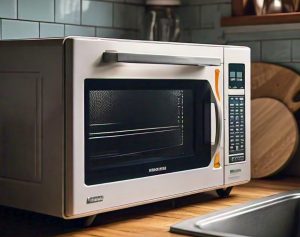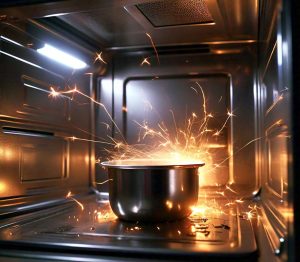A microwave oven is a common kitchen appliance that uses electromagnetic radiation in the microwave frequency range to heat and cook food.
The question here pertains to whether or not you can run this appliance without any contents inside, also known as operating it empty.
In this article, we will delve further into what constitutes a microwave oven, its functioning, and whether running it empty can cause any potential harm or damage. If it is deemed unsafe to operate an empty microwave oven, we shall discuss the reasons why along with viable alternatives. In addition to these main aspects regarding microwaving practices, we will also provide some handy tips for the safe usage of microwaves and precautions that should be taken during operation. Moreover, frequently asked questions on the topic would be answered followed by our final take on the matter.

Jump To:
Is It Safe to Run a Microwave Empty?
No, operating your microwave without anything inside is not recommended. The device can potentially harm itself due to the absence of food or liquid to absorb the microwaves. Different electronic components, such as its magnetron tube which produces those microwaves, could overheat and become damaged. Hence, for safety and efficiency reasons alike, you should avoid running an empty microwave.
Check out if a microwave can leak radiation.
Facts About Running a Microwave Empty
Here we will discuss the important things to note about running a microwave empty.
- Potential Damage: Running a microwave without anything inside can potentially damage the device.
- Magnetron Burnout: The magnetron, which generates microwaves, could burn out if it doesn’t have anything to absorb the energy.
- Safety Concerns: This act can pose safety concerns and might even cause a fire in extreme cases.
- Lifespan Reduction: Operating an empty microwave reduces its overall lifespan by causing unnecessary wear and tear.
In conclusion, it is critical not to run your microwave empty due to potential damage and safety risks.
Check out if microwave radiation can hurt you.
Now we will discuss some other things about operating microwaves properly.
What are the Alternatives to Running a Microwave Empty?
A perfect alternative to running a microwave empty is using it with a load like food or liquid, which absorbs microwaves and prevents any potential damage. Other options could be utilizing other cooking appliances such as toaster ovens, conventional ovens or stovetops that are known for their safe heating technique.
Tips to Safely Run Your Microwave
It is highly recommended not to run your microwave empty.
- Always ensure there is something inside the microwave before running it. This could be food or a mug of water.
- Avoid metal objects in the microwave as they can cause sparks leading to fire risk.
- Cover your food with a suitable lid or wax paper to prevent splatters and messes inside your appliance.
- Regularly clean your microwave after use for its longevity and efficient performance.
Clean spills immediately so they don’t harden over time.
We have discussed key points about not running an empty microwave along with safer alternatives and tips.
In our next section, we will discuss some commonly asked questions related to the everyday use of this appliance.

Frequently Asked Questions (FAQs)
We will now look at the most commonly asked questions related to microwaving and heating.
Can you run a microwave empty?
No, running a microwave empty can be harmful. Microwaves work by producing radio waves that excite the water molecules in food, which generates heat. When there’s no food or liquid to absorb the microwaves, they bounce back into the oven itself. This could potentially damage your microwave or even cause a fire.
Does running a microwave shorten its lifespan?
Yes, frequently using your microwave can shorten its lifespan. Every time you use it for heating or cooking food, wear and tear happens on its internal parts such as the magnetron tube responsible for generating microwaves. To prolong the life of your appliance, regular maintenance is recommended.
Does metal damage microwaves?
Absolutely! Metals reflect microwaves instead of absorbing them like foods do which might lead to sparks inside your device causing serious damage or even a fire hazard; hence avoid putting metal objects in the microwave.
What happens if I put a non-microwave-safe material inside the microwave?
If you put non-microwave-safe materials inside a microwave these materials could melt or catch fire because they are not designed to tolerate high temperatures generated by microwaves also emit toxins that can contaminate stored food within making it unsafe to consume.
Check out how hot a microwave can get.
In conclusion for this FAQs section, it’s important not only to know how but also what is suitable when utilizing our handy kitchen appliances such as microwaves.
Final Word
Maintaining proper usage with any electrical appliance including our very useful microwave helps extend their overall lifespan and ensures safety. Knowledge about what materials can or cannot be microwaved is not only essential for the longevity of your appliance but also critical to prevent possible health hazards. Therefore, remember to never run your microwave empty, avoid frequent use when unnecessary and steer clear of microwaving metals or non-microwave-safe materials.



